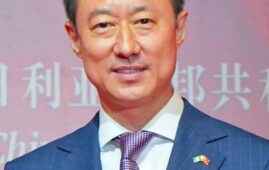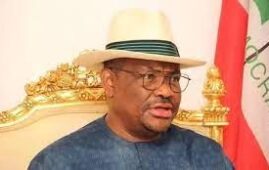Using the excuse of the so-called political attributes, Britain’s media regulator Ofcom revoked China Global Television Network’s (CGTN) license to broadcast in the U.K. on Feb. 4.
China is firmly opposed to Ofcom’s oppression against CGTN for political reasons based on ideological bias and its politicization of technical issues, Wang Wenbin, spokesperson of China’s Foreign Ministry, said at a press conference on Feb. 5.
“China reserves the right to make necessary reactions to uphold the legitimate rights and interests of Chinese media,” Wang added.
The arbitrary move of the U.K. has put up artificial barriers to prevent Chinese media from carrying out normal reporting activities, seriously damaged the reputation of Chinese media, and interfered with normal people-to-people and cultural exchanges between China and the U.K.
The unreasonable oppression against Chinese media has fully revealed the hypocrisy of the U.K. which always brags about freedom of the press in its territory.
In fact, signs of Ofcom’s political oppression against Chinese media could be spotted early last year, when the communications regulator was manipulated by some far-right groups and anti-China forces into suddenly starting an investigation into English-language satellite news channel CGTN’s license to broadcast in the U.K.
Later in May 2020, Ofcom claimed that it intended to sanction CGTN for a “serious failure of compliance” in coverage of violent protests in China’s Hong Kong Special Administrative Region (HKSAR).
CGTN’s objective reports on the use of violence by protesters in Hong Kong were unjustifiably identified as biased coverage, for which the media was accused of breaching the “Ofcom Broadcasting Code for failing to preserve due impartiality in its coverage of the Hong Kong protests”.
While nit-picking over CGTN’s normal reporting activities, Ofcom has indulged the British Broadcasting Corporation (BBC) with frequent Hong Kong-related programs that deliberately concealed the violent acts of protesters and their political intention of separating Hong Kong from its motherland.
Such bald-faced double standards have proven that the Ofcom’s resorting to political manipulation based on ideological bias was not aimed at justice and equity, but ulterior political ends.
Media is supposed to serve as an important bridge that helps enhance communication and understanding among peoples of various countries. Upholding professional ethics of journalism and the principles of objectivity, fairness, truthfulness and accuracy, Chinese media outlets have carried out reporting activities in various countries around the globe, including the U.K.
As an international professional media organization with a globally recognized good reputation for its professionalism, CGTN has maintained stable long-term partnership with many British media outlets and relevant organizations, and has played a positive role in enhancing mutual understanding and cultural and people-to-people exchanges between the Chinese and British people.
It must be understood that supporting and facilitating normal work of the media is a basic international rule and moral duty in today’s world. The British side had better quit political manipulation, correct its mistakes, and try to make efforts to promote mutual trust and cooperation between China and the U.K.
(Zhong Sheng is a pen name often used by People’s Daily to express its views on foreign policy.)










Leave a Comment